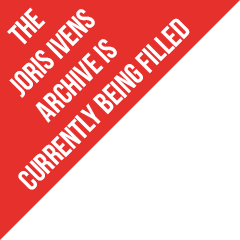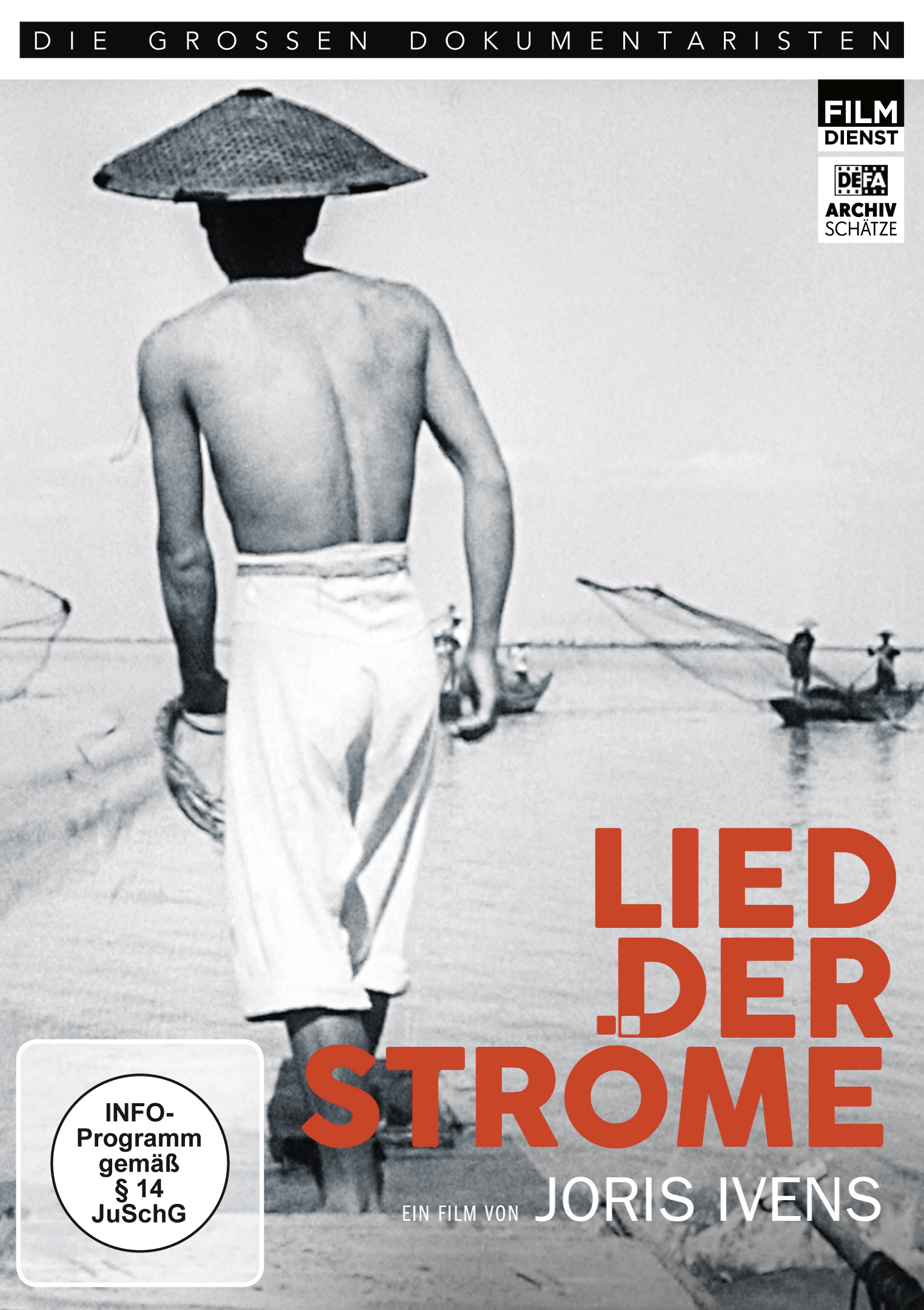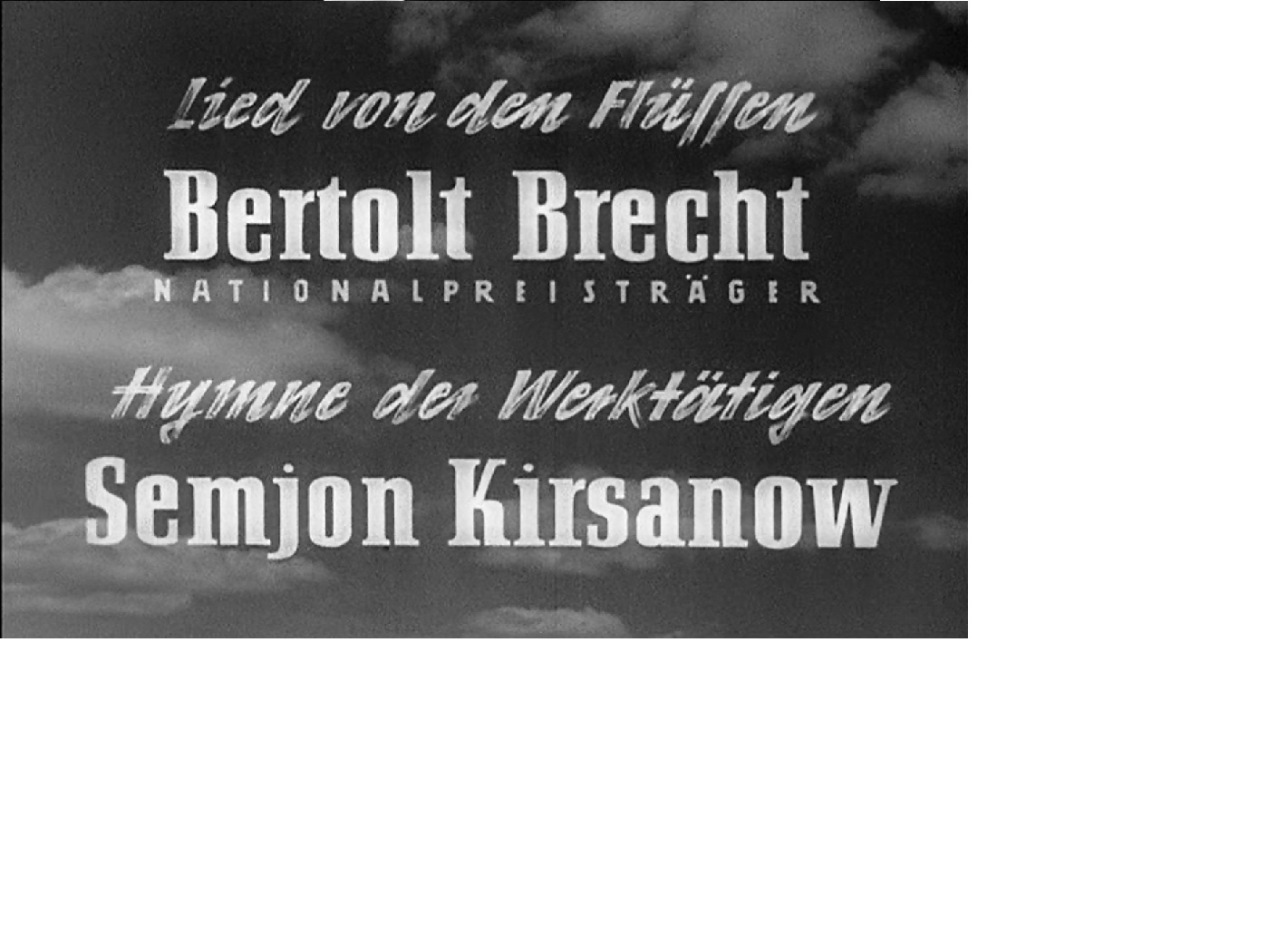

Een volslagen uniek, zeldzaam icoon in de documentaire filmgeschiedenis: Joris Ivens’ Lied der Ströme (1954) is door Absolut Medien in Berlijn op DVD uitgebracht en te koop voor 14,90 euro. Dit hoogtepunt in compilatiefilm werd destijds door 250 miljoen mensen bekeken, maar de kans dat je deze film vandaag de dag nog ergens ziet is zeer klein. Ralf Schenk, directeur van de DEFA Stiftung in Berlijn en bestuurslid van de Ivens Stichting besloot dit filmfresco over de arbeidersbeweging aan de oevers van zes wereldrivieren uit te brengen tegelijkertijd met Günter Jordans boek over Ivens’ Duitse films (november 2015).
De vele gezichten van Lied der Ströme
Das Lied der Ströme is een unieke film met vele facetten: het is een megalomane productie, met een nooit eerder vertoonde wereldwijde opzet waaraan tientallen filmmakers van vijf continenten een bijdrage leverden, waarmee de film vooruitloopt op de komst van de televisiesatelieten, met ideologische pretenties gedurende het hoogtepunt van de Koude Oorlog, die overschaduwd werd door een constante en reële dreiging van een atoomoorlog, met een mijlpaal in het gebruik van de compilatiefilmstijl en een wereldwijde verspreiding waarmee 250 miljoen mensen bereikt werden, getroffen door censuur in de VS en vele andere Westerse landen en gemaakt door de fine-fleur van linkse kosmopolitische kunstenaars, zoals Brecht, Sjostakowitsj, Picasso en Pozner.
Hoewel bij lange na niet zo populair en bekend is Ivens’ film de communistische tegenhanger van de beroemde fotoexpositie ‘The Family of Man’, die een half jaar na première van Lied der Ströme in september 1954 werd geopend.
De Amerikaanse filmwetenschapper Charles Musser van de Yale University gaf een lezing over deze film ter gelegenheid van het door de Ivens Stichting in New York in 2002 georganiseerde Ivens retrospectief in het Walter Reade Theater van Lincoln Center in New York en schreef daarna een inzichtelijk artikel in het Canadese filmtijdschrift ‘Cinémas’, waarin de fascinerende aspecten van Lied der Ströme worden belicht:
‘Although produced by the DEFA Studio for Newsreels and Documentary Films in East Germany (DDR), Lied der Ströme (Song of the Rivers) was funded by the communist-led World Federation of Trade Unions. “The third World Trade Union Congress organized in 1953 by the World Federation of Trade Unions (WFTU) is of course the basis of the film,” remarked WFTU general secretary Louis Saillant. Some of the film was shot at the WFTU conference in Vienna, which opened on 10 October 1953, but the bulk of the material was shot around the globe. A host of international left-leaning stars participated in the film’s production. American performer Robeson and Dutch filmmaker Ivens were joined by German writer Bertolt Brecht, Russian composer Dimitri Shostakovich, French writer
Vladimir Pozner (an old friend and collaborator of Ivens, Robeson, and Brecht), and Spanish artist Pablo Picasso (with whom Robeson had recently shared the International Peace Prize).
This international band worked with an array of mostly anonymous camera operators from all over the world: 32 in all, said to be from 32 different countries. The marquee artists were complemented by a group of political leaders who appeared in the film, many of whom had been jailed or encountered other forms of repression. Its staff of anonymous craftsmen likewise had their counterparts in the rank and file of ordinary working people depicted in the film. Whether stars or
foot soldiers, all were united in the struggle to achieve justice and revolution. Although Song of the Rivers had its initial premiere in Berlin at the Babylon Filmtheater on 17 September 1954, Ivens continued to refine the documentary long after that date. Before postproduction was completed, the filmmakers had generated at least 18 versions of the film in many different languages.
According to some sources, Song of the Rivers was eventually shown to more than 250 million people. Its immediate subject is the struggle of oppressed peoples throughout the world as
they organize, attend the third World Congress of Trade Unions, and seek to overthrow Western capitalism in pursuit of a socialist utopia. The film is much more than an oversized news account of its subject. The first lines of narration, recited over scenes of massive construction projects, are: “Aye, but man can yet be the master. By the power of his strong right arm and his intelligence.” The film is fundamentally a celebration of humanity’s ability to transform the natural world. The efforts
the World Congress of Trade Unions are part of a larger effort to bring this labour and intelligence fully to the fore.’
Voor het gehele artikel, zie:
http://www.erudit.org/revue/cine/2002/v12/n3/000738ar.pdf
Informatie over deze DVD, zie
https://absolutmedien.de/film/4040/Lied+der+Stroeme

DVD lieferbar € 14,90
Best. Nr.: 4040
ISBN: 978-3-8488-4040-3
EAN: 978-3-8488-4040-3
FSK: Info
Vertriebsgebiet: GAS
Länge: 108
Bild: PAL, S/W, 4:3
Ton: Mono
Sprache: Deutsch
Regionalcode: codefree
Label: absolut MEDIEN/Große Dokumentaristen
Edition: Defa-Stiftung
Reihe: Die großen Dokumentaristen
Rubrik: Dokument
Genre: Reise/fremde Länder
